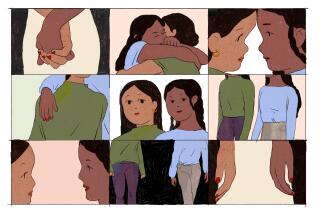A Blow to Africa’s Renaissance
- Share via
JOHANNESBURG, SOUTH AFRICA — The outbreak of a “hot war” between Eritrea and Ethiopia is potentially a major blow to Africa’s incipient renaissance. The fighting comes at a time when South Africa’s deputy president, Thabo Mbeki, is struggling to promote Afro-optimism in Africa, Washington, Bonn, London, Paris, Tokyo, Stockholm, Beijing and elsewhere. Mbeki’s idea of an African renaissance is to foster a new pan-Africanism, one adapted to the continent’s 40 years of post-independence history, through accountable and democratic politics and free-market economics. But the Ethiopia-Eritrea dispute, in underscoring Africa’s already tainted image, works against the idea of an African rebirth.
The conflict is a setback for the countries’ leaders, Isaias Afwerki of Eritrea and Meles Zenawi of Ethiopia, who have recently been counted among a new generation of post-Cold War African leaders. This informal club also includes Mbeki, Mali’s Alpha Oumar Konare, Ghana’s Jerry J. Rawlings, Rwanda’s Paul Kagame and, most importantly, Uganda’s Yoweri Museveni. Festus Mogae, the recently inaugurated president of Botswana, is the clique’s newest member.
These African leaders are highly critical of what they see as the “unholy Washington consensus” among the White House, World Bank and International Monetary Fund. At the same time, they dismiss the “blame the West for everything” culture. For many of them, economic renewal comes first, responsible democratic politics a distant last. As such, their records on accountable and inclusive government are mixed, at best. They remain deeply intolerant of civil society.
Relationships among them are marked by jealousies, infighting and territoriality. In principle, the “new” Africans typically advocate “African responsibility for African problems,” but renewed fighting between Eritrea and Ethiopia suggests that principles sometimes lose out to old grudges. The war between these erstwhile friends highlights the limits of the “newness” of Africa’s leaders, as well as the pitfalls facing Mbeki’s African renaissance initiative.
The heavy military exchanges between the two sides underscore the intractabilty of unsettled scores in Africa. The tensions between Eritrea and Ethiopia date back to at least 1962, when Ethiopia annexed Eritrea. The move triggered a 30-year war, spearheaded by underground Eritrean liberation movements, against Ethiopia’s despotic leaders, Haile Selassi and Mengistu Haile Marriam. The struggle came to a head in 1991, when the Ethiopian People’s Revolutionary Democratic Front (EPRDF) and Zenawi defeated the Ethiopian army. The surprise victory of Zenawi and the EPRDF laid the foundation for the U.N.-sanctioned referendum on Eritrean self-determination in April 1993, in which 98% of eligible Eritreans voted for independence. In May 1993, the independent Republic of Eritrea was born.
One of the unsettled scores that fuels Ethiopian-Eritrean tensions involves the border between the two countries, the 400-square-kilometer Tigre province, that was never properly determined. A border commission, jointly set up by the two countries in 1996, failed to resolve the issue.
Besides the border quarrel, political and economic conflicts have exacerbated the hostility. As a new and fragile independent state, Eritrea understandably has been keen to assert its autonomy from its former colonizer. But the more it flexes its sovereignty, the more envious Ethiopia becomes. The jealousy was brought into sharp relief when Eritrea established its own currency, the nafka.
Ethiopia and Eritrea seldom cooperated; when they did, it was marked by aggressive competition. Thus, Eritrea’s decision to bomb the Ethiopian border town of Adigrat, which set off the latest hostilities, was the culmination of years of ill will. The recent spate of mutual expulsions of citizens by the two warring states’ leaders will only add to tensions; so, too, will mutual accusations of “destabilization.”
The arbitration efforts sponsored by the Organization of African Unity can only bear fruit if they address seriously the issues of genuine demilitarization and lasting borders. While Libya’s Moammar Kadafi has had limited success in stopping the fighting, mediation efforts by Djibouti, the United States, Rwanda and the Sahelian-Saharan Group have, so far, had little impact. Proposals to deploy foreign troops aren’t serious unless they are coupled with a credible cease-fire.
South Africa’s Mbeki and Uganda’s Museveni should consider getting directly involved in the arbitration efforts with the objective of trying to broker and cement a credible peace pact. The two leaders have personal friendships with both Zenawi and Afwerki.
Giving Museveni a responsible statesman role in ending the war is all the more vital because if a settlement proves elusive, the Ugandan president may chose sides and align himself with Ethiopia’s Zenawi. Museveni thus could easily become a force-multiplier and part of the problem. The last thing the Horn needs is for other African powers to get embroiled militarily. The only thing such a scenario would do is to expose the limits of the “new” Africans.
Clearly, it was foolhardy to expect the age-old Ethiopian-Eritrean conflict to vanish overnight and, accordingly, it should not have come as a surprise that two ostensibly “friendly” countries would declare war on each other; theirs was a false friendship, built on false foundations. The question now is whether the leaders of the African renaissance can prevent the Ethiopian-Eritrean dispute from becoming another 30-year war.
More to Read
Sign up for Essential California
The most important California stories and recommendations in your inbox every morning.
You may occasionally receive promotional content from the Los Angeles Times.













